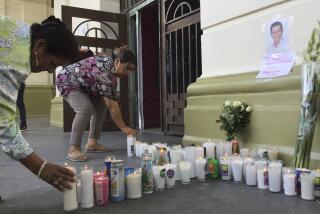Political Unrest Mounts in Iraq
- Share via
BAGHDAD — Iraqi Prime Minister Ibrahim Jafari sought Wednesday to quell political disputes in the capital and the south, as Baghdad’s mayor protested his ouster at gunpoint and rival factions fought over the governorship of a province.
The political squabbling came amid more violence, with fighting in Mosul and a bombing in Baghdad killing at least 21 people. Kidnappers abducted a high-ranking Interior Ministry official, and the U.S. military announced the death of another soldier in fighting Tuesday, bringing to seven the number of U.S. troops killed that day.
Baghdad Mayor Alaa Tamimi, a controversial figure, remained in hiding Wednesday after dozens of gunmen took over his office Monday and physically installed Baghdad’s governor in his stead.
“What happened to me was unbelievable. It was horrifying and very dangerous to this country to be treated in such a manner,” Tamimi said in a telephone interview. “The municipality was invaded by armed forces, occupying forces.”
The armed men appeared to be bodyguards of the governor; some witnesses asserted they were linked to Shiite Muslim militia groups. The incident left Tamimi angry and agitated.
“This is terror! It’s a lot worse than Saddam’s time -- the governor of Baghdad penetrates the municipality with more than 120 armed men with him, I don’t know to whom they belong!” he screamed. “The governor went into my office and sat behind my table.”
A spokesman for the municipality rejected details of Tamimi’s account, estimating that far fewer armed men were involved in the takeover, which occurred during a sandstorm when few people were at work. Some at the building said perhaps only 30 took part. But there was no dispute that Baghdad Gov. Hussein Tahhan had taken over the mayor’s job. He insisted Wednesday that he would serve only temporarily.
Tahhan is a member of the Supreme Council for Islamic Revolution in Iraq, a leading Shiite political party that is a member of the prime minister’s parliamentary bloc. On Wednesday, Jafari weighed in, saying he favored replacing Tamimi.
Tamimi, a civil engineer who once worked in Iraq’s nuclear program, fled the country in the 1990s and returned after President Saddam Hussein’s ouster, promising to clean up Baghdad. He was appointed mayor before the U.S. transferred sovereignty back to Iraqis in June 2004.
A new Baghdad provincial council was elected in January, and it asked Tamimi to step down. Some members had questioned his integrity; others expressed frustration that he had not delivered on promises to provide basic services and get rid of corruption.
Jafari said Tamimi’s removal was justified because he had also failed to satisfy the Iraqis running the local government.
“The municipality head [Tamimi] was appointed before this government,” Jafari said at a small news conference. “Thus, we received a request from the city council to dismiss him and we got complaints from people [about him]. Every official should know how to satisfy people. The legitimacy of any official comes from people’s reaction to his work. This is the new Iraq.”
A member of the Baghdad city council, who asked not to be identified because he feared reprisals, said the council had appointed Tahhan as the new mayor but that there was great confusion at the moment. “This is a democratic chaos,” he said.
As the controversy in Baghdad continued, Jafari dispatched emissaries to the southern town of Samawa to try to halt a running fight among militias linked to three Shiite political parties. Although Japanese troops are stationed in the city, protests and riots earlier in the week left at least one person dead and dozens injured.
The demonstrators, many of them allied with radical Shiite cleric Muqtada Sadr, have demanded the resignation of the provincial governor, who is allied with the Supreme Council for Islamic Revolution in Iraq party. Meanwhile, SCIRI members accused the local police chief of attempting to assassinate them. At a meeting Wednesday with Jafari’s envoys, the factions hurled insults at one another.
The upheaval over the Baghdad mayor’s job and the unrest in Samawa underscored the fragility of Iraq’s local political institutions as the national government works to craft a new constitution and cope with violence.
On Wednesday, kidnappers abducted Brig. Gen. Khudayer Abbas, who heads the administrative affairs office at the Interior Ministry, as he was driving in central Baghdad in broad daylight, said Maj. Abbas Mohammed Salman.
Later in the afternoon, Abbas’ wife received a call from her husband’s cellphone. The speaker, who was not her husband, told her, “We are keeping your husband as a hostage,” police sources said.
Meanwhile, a suicide car bomber targeting a police patrol in the violent Ghaziliya area of western Baghdad killed six people, including two policemen, and injured 16.
Many residents of the area could not stop talking about “poor Raaid,” a 22-year-old newspaper vendor, whose tiny kiosk was blown apart. People in the neighborhood knew him well because they stopped by daily to chat and buy papers from him.
In the north, fighting in Mosul reportedly killed 15 people, but details were scarce.
The U.S. military announced that a soldier from an Army unit attached to a Marine division had been slain Tuesday near Habbaniya, about 10 miles from Fallouja, west of Baghdad.
The death brought to seven the number of U.S. servicemen killed Tuesday. Four soldiers died in an attack near Bayji in northern Iraq. Another died in a suicide bombing in Baghdad, and a Marine died in western Iraq.
*
Times staff writers Suhail Ahmad and Caesar Ahmed contributed to this report.
More to Read
Sign up for Essential California
The most important California stories and recommendations in your inbox every morning.
You may occasionally receive promotional content from the Los Angeles Times.










